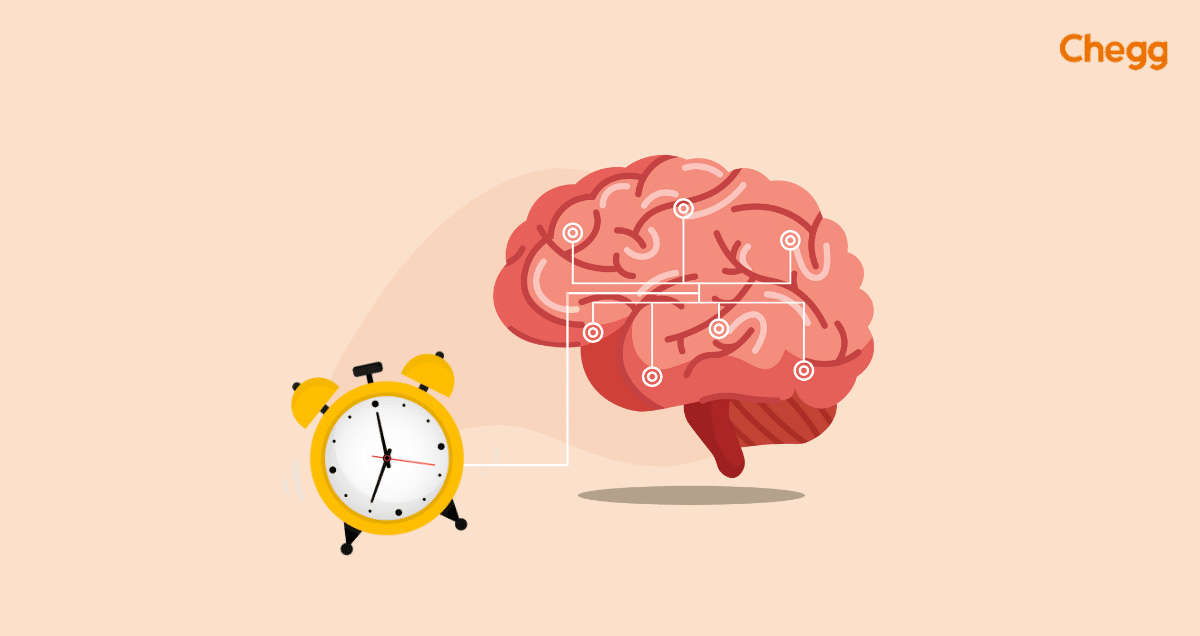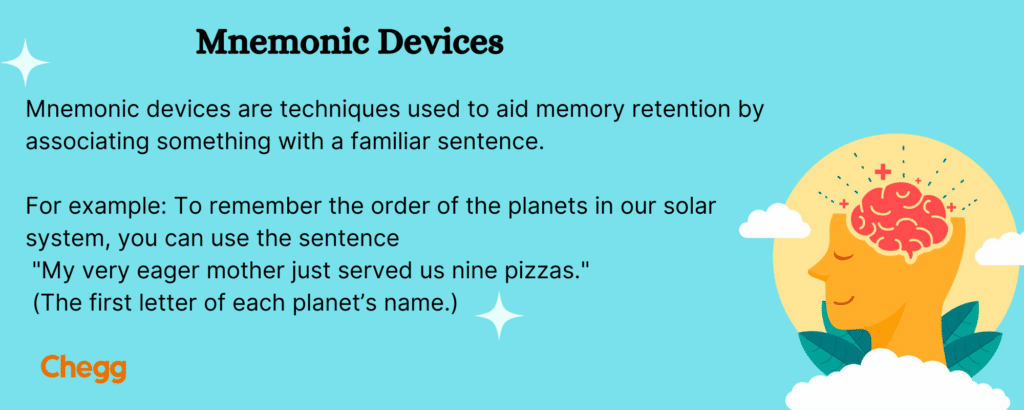
Table of Contents
Did you know that the average human brain can hold data in a maximum of 2.5 million gigabytes? Would you believe it if we told you that you forgot 50% of what you learned within an hour? Learn how to memorize faster and easier for exams for a longer time in this guide.
Memory is the ability to retain things you have learned. When you say you ‘remember’ something, you’re talking about your memory. It is crucial to have a good memory so you can apply your knowledge to practical situations.
Each area of the 10 tricks to memorize faster demands knowledge in order to be an expert in it. You store this knowledge in your memory from things you have learned. You may learn things more quickly and effectively if you have an excellent memory! It enables you to concentrate and focus well. The tips in this article can help you sharpen your memory. Now you too can have a good memory and perform better!
Understanding Memory
Let us enlighten you with something interesting. Did you know that the internet is actually making your memory worse? When you have information just a single search away, it makes you less likely to remember it! Your emotions heavily influence your memory. Anything you associate strong emotions with is more likely to stay with you!
Memory is a process. Tricks to memorize faster involve not just storing information in your brain but also acquiring and retrieving the same. In addition to this, there are three sorts of memories—working, short-term, and long-term. This is how your brain captures information:
- First, information enters your working memory via the five senses. Through the process of ‘encoding’, it first turns information into a usable form. The encoded information is then saved in memory.
- This knowledge is ingrained in your short-term memory through repetition.
- When it is further revised, it gets stored in your long-term memory. You can now remember it for a longer time!
- What you have learned can now be recalled or retrieved whenever needed.
Biologically, neurons have connections between them. Researchers believe that memories are formed by using these connections. Either new connections are formed or an old one is strengthened to create a memory. This is the reason why rehearsing and repetition keep things fresh in your mind!
Preparation: Setting the stage
Creating an optimum study environment is a critical first step toward good memorization. The ideal study location should be well-lit, calm, and distraction-free. Temperature regulation is critical; research indicates that a slightly cold environment (about 70°F/21°C) improves optimal cognitive function.
Time management is equally important. The concept of ultradian rhythms promotes studying in 90-minute blocks with 20-minute breaks. This pattern is consistent with our brain’s normal attention cycles and helps to prevent cognitive weariness.
Physical and mental preparation includes a number of crucial components. Adequate hydration, good posture, and regular mobility break all help to promote optimal brain function. Additionally, practicing mindfulness or brief meditation before study sessions can improve focus and memory recall.
How to Recall What You Read?
How can you recall what you read? It is critical to understand your study habits. A strategic memory plan can help you recall what you’ve read and studied for longer. This section includes some strategies for implementing strategic planning.
Understanding your learning patterns
Who doesn’t want favorable results for their efforts? To accomplish this, however, we must first comprehend ourselves. It teaches us the optimal way to interpret and absorb new information. There are four main learning styles, denoted by the abbreviation “VARK”.
VARK stands for:
Visual: People who prefer learning by their sense of sight.
Auditory: Learners who understand and learn better by listening.
Reading (or Writing): These people prefer learning through written notes.
Kinesthetic: These learners best learn by experiencing or doing things.
Analyse and understand the best learning method for yourself.
How to Memorize Faster and Easier for Exams
Did you know that humans forget nearly 70% of the information they learn within 24 hours? Thus, it is much more crucial to strengthen memory using 10 Tricks and memorize faster. The question of how to memorize faster and for a longer time becomes a core concern.
Here are a few memory techniques to help you do it!
1. Use Mnemonic Devices

Mnemonics are nothing but simple tricks with which you can remember things more easily. It could be anything like creating a song or an acronym for remembering information. For example, a common mnemonic is the term VIBGYOR. It is used to remember the colors of a rainbow in order.
2. Practice Active Recall to Memorize Faster
When you practice recalling learned material from the past, it is called active recall. In this method, you test yourself on things you have stored in your memory. This is done to see how much you remember from the original content. Studies have shown that those students who use active recall perform better!
3. Break Information into Smaller Chunks
The process of chunking involves breaking information into smaller pieces. This helps you to remember things more easily when you group little bits together. For example, while remembering phone numbers, you may say some digits together. The rest of the digits are grouped and spoken separately. This is called chunking.

4. Utilize Visualization and Association Techniques
It is easier for you to remember images. They stick with you better than facts and figures. In order to remember things more easily, it helps to picture them. This is called visualization. Once this is done, a strong association with the image is formed. The image is linked with the information.
5. Use the Memory Palace Technique
This is a very old trick that was found by the Greeks. In the memory palace technique, you visualize a place that you know very well. Now you will use this image to store and recall any kind of information. You associate different information with different parts of the memory palace.
6. Get Enough Sleep
Sleep has been shown to improve memory and focus. It does not make one smarter or guarantee success. But it does help you to pick up and remember things better. In some Harvard studies, it was found that sleep helped participants memorize recently learned material better.
7. Exercise Regularly
Exercise causes an increase in the volume of those brain areas that control memory. Several studies have shown proof of it. Exercise helps to improve sleep as well. Sleep in turn improves your memory. Many people feel like they have a clearer head after they are done exercising. So, exercise also helps you to cut down on your stress levels. You now have more mental energy to spare for memorizing things!
8. Reduce Stress
When we are stressed, it is harder for us to learn things. When the encoding process is flawed, storage and retrieval are also affected. Stress also makes you tired. While you’re fatigued, it is tougher to pay attention and absorb information. You can manage stress using several techniques including mindfulness, breathing exercises, etc.
9. Eat a Healthy and Balanced Diet
Eating saturated fats has been shown to result in poor memories in people. But, if you eat lots of fruits and greens, it improves blood circulation and blood vessel health. This reduces the risk of strokes that can damage memory.
10. Practice Mindfulness and Meditation
Meditation and mindfulness are very simple techniques that you can follow. They call on you to focus your attention and practice being present at the moment. This helps you to build on your memorization skills. Successful memorization involves paying attention to the information you’re trying to store. Therefore, mindfulness and meditation are great ways to help you achieve that!
Also Read: How To Study for Long Hours: Smart Study Habits and Tips
Memory Techniques- How to Memorize Fast and Easier for Exams?
Memory technique is a brain-training practice that helps you retain information and memorize subjects faster. Students struggle with retention and memorization and ask, “How can I memorize quickly?” Here are some helpful tips:
- Understanding the topic first: This helps create a strategic plan for learning and retention.
- Linking the studied information with previously learned information: This aids in better retention of both concepts.
- Studying before sleep: Sleeping right after studying allows the brain to process and store information more conveniently.
- Self-testing: Self-testing after a gap allows for active recall and subject revision.
- Distributed Learning Patterns: Repeating subjects over time ensures well-memorized content.
- Writing: Encoding information and learning through hand-brain connection aids in better memorization.
- Using Visual Tools: Visual tools like diagrams and flow charts are suitable for visual learners.
- Songs and Jingles: Songs, jingles, and podcasts of lectures are convenient for auditory learners.
A Good Memory is Your Friend
Memory is one of the most important processes you take part in. It helps you get through each day with ease and efficiency. It becomes all the more crucial when you have a big test to study for! A common fear that students have before exams is about forgetting what they have learned. Hence to memorize faster 10 tricks is crucial.
If you have a good memory, it becomes that much easier for you to prepare for your tests. Even during an exam, your recall will be better, and you will be able to score well. Memory is a skill. Like all skills, there are ways to get better at it, and with practice, it only goes up and grows!
You can resort to several memory techniques to do so. Hence, you can exercise, eat healthier, meditate, and use active recall among other things. You can stretch the limits of your memory and perform better!
Frequently Asked Questions
1. How can I memorize fast in 5 minutes?
Memorization can happen very quickly if you know what to do! There are several memory techniques that you can use for it. Repetition of information helps to pass it down to long-term memory. You can create mnemonics for things that you find hard to memorize. Learn long sequences of information by chunking it into smaller pieces.
2. How to memorize faster for exams?
Creating practice questions and using active recall is an effective way to memorize faster for exams. Making a song to remember information or using visualization and creating mental images can also aid in retention. Studies show that students who use active recall perform better on exams.
3. What are memory improvement techniques?
Memory improvement techniques can enhance the number and duration of things you can remember. Use these memory techniques actively in your daily life to improve your memory and retain information more effectively.” This encourages the reader to actively engage with the techniques mentioned in the sentence and apply them in their daily life rather than passively reading about them.
4. How can I memorize 10x fast?
Memory is a skill that can get better if you practice enhancing it. You can increase the number of things that you can remember. You can also expand the duration for which you can remember information as well. It is possible through a number of memory techniques that will help you increase your focus and concentration. Get learning
To read more related articles, click here.
Got a question on this topic?